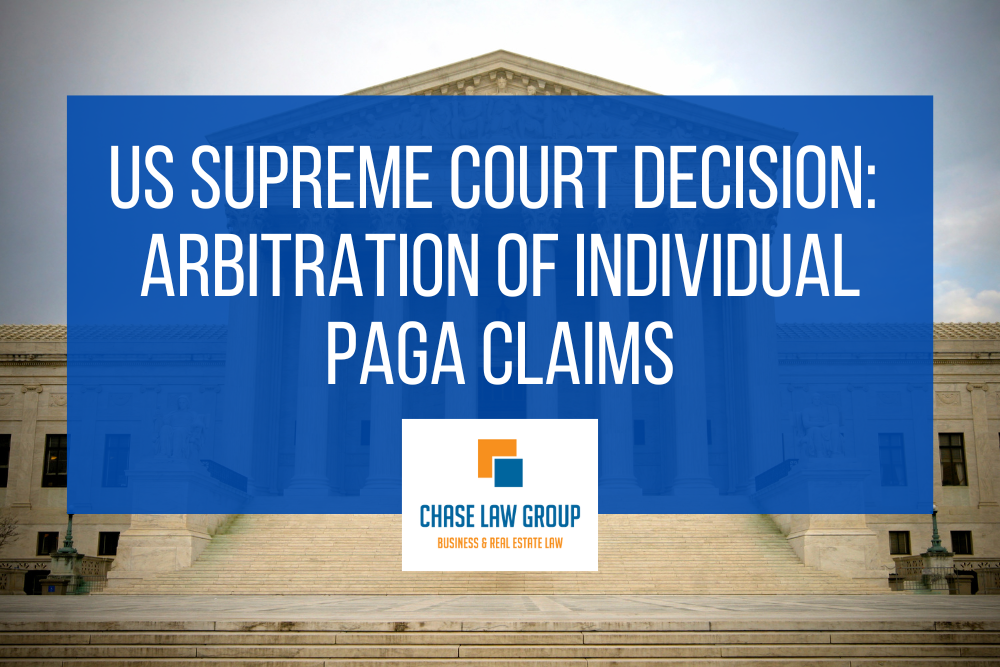US Supreme Court Issues Significant Decision Permitting Arbitration of Individual PAGA Claims
By Admin June 23, 2022 Category: Business Law

In a significant victory for California employers, earlier this month the US Supreme court issued a decision in Viking River Cruises v. Moriana, that allows California employers to compel arbitration of Private Attorney General Act (“PAGA”) based claims of an individual and obtain a dismissal of all other aggrieved PAGA employees’ claims. The impact of the decision could potentially result in greatly diminishing an employer’s exposure for penalties under PAGA.
How PAGA Claims Were Litigated Prior to the Viking River Cruises Decision
Prior to Viking River Cruises, under PAGA, an individual Plaintiff could bring a PAGA claim of their own as well as on behalf of all other “aggrieved employees” for Labor Code violations which provide for penalties in the amount of $100 for the first violation and $200 for all violations thereafter, for each and every pay period that they occur. These penalties can mount up quickly into a very large award, depending on the number of employees and violations that occurred before the Viking River Cruises decision, pursuant to the California Supreme Court decision in Iskanian v. CLS Transportation Los Angeles LLC, if an employee had entered into an arbitration agreement that covered their employment based claims, the PAGA claims would be precluded from arbitration and remain in court while the individual claims were litigated in arbitration. Once an award was rendered on the employee’s individual claims in arbitration, the PAGA claims would be litigated in court.
The Viking River Cruises Decision Determines That Individual PAGA Claims Can Be Arbitrated
In its decision the US Supreme Court held that that if there exists an enforceable arbitration agreement with an employee who brings PAGA claims against their employer, the individual PAGA claim of the employee will be subject to arbitration and the remaining PAGA claims of all other employees will be dismissed due to lack of standing. Note however that another employee could still bring a PAGA action and if they have not entered into an arbitration agreement, then the PAGA claims, both the individual claim of the employee filing the suit as well as all other aggrieved employees, will proceed in court.
Take Aways of Viking River Cruises Decision
The important take away of the Viking River Cruises decision is that employers who have arbitration agreements in place with their employees, should review their arbitration agreements to ensure they have the necessary language that will allow for compelling individual PAGA claims to arbitration. Additionally, employers who do not have arbitration agreements currently in place should consider the use of arbitration agreements with their employees. However, note that California prohibits mandatory arbitration agreements entered into after January 1, 2020. As such, if an employee, new or existing, will not agree to enter into an arbitration agreement, employers cannot retaliate against the employee either by way of not hiring them, termination or other adverse employment action. We also note that Supreme Court Justice Sotomayor in joining the Court’s decision suggested that the California Legislature could modify the standing requirements under PAGA which would result in PAGA claims not being dismissed as a result of this decision, although such a change must be “within state and federal constitutional limits” which is a high bar. Thus, we will have to wait and see what if anything the California legislature may do to address the Viking River Cruises decision. But, for now, employers should strongly consider implementing an appropriate arbitration agreement that compels arbitration of the individual employee’s PAGA based claims.
Should you have any questions about the Viking River Cruises decision or about the use or implementation of arbitrations at your company contact our employment attorney Scott Liner at [email protected].

